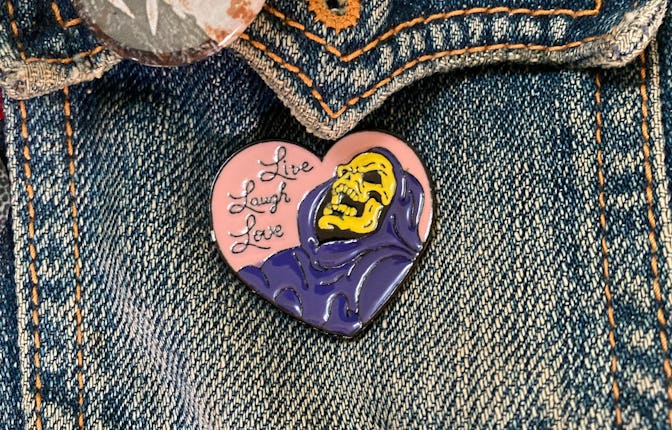Bad vibes only!
How ironic affirmation memes won over a lifelong nihilist.

The cult of positivity is my own personal arch nemesis. In my tiny sliver of the yoga-verse, I am famous for how much I hate affirmations. Get out of my face with reality manifestation fantasies, because real science has my back on this one. So when I started following @afffirmations on Instagram, it was mostly because I am always curious about things that are #trending. But not only has it become my favorite account, I actually find that it makes me feel more okay in the world and somehow less lonely. Here’s how these sparkly neon affirmation memes won over this stalwart nihilist.
In case you’re wondering who hurt me and made me so bitter and jaded: Yes, my anti-Good Vibes-Only stance did actually start many many years ago. I vividly remember the first time I told someone that I thought positive affirmations were bullshit. I was standing in line for the bathroom with an acquaintance at an art opening in Brooklyn. “I started doing yoga,” the woman told me. “Bikram.” I nodded because I didn’t want to say what I was thinking, which was, “That’s not yoga. That’s a cult.” To each their own, after all.
She told me that her teacher gave her an affirmation/mantra and I was intrigued. Hot yoga isn’t exactly known for being steeped in spirituality. To my horror, the woman looked into the mirror and said, “I am beautiful. I am beautiful. I am beautiful.”
I felt paralyzed with sympathetic embarrassment. “Wow,” I said, “wow.” There was an uncomfortable silence. “I paid extra for the affirmation because it’s not part of class,” she told me. Before I could harness myself, I said, “That sounds like a scam.”
I felt guilty for shitting on that woman’s positivity, but I stand by my stance — selling people trite aphorisms is the perfect example of the way capitalism promotes the idea that we are lacking and then sells us the promise of wholeness in the form of canned phrases. This instance of affirmation peddling was the first time I think I understood that some American yoga teachers weren’t just culturally appropriating a centuries old spiritual practice for fitness, they were also using it to sell people self-esteem.
The yoga world, of course, is not the only place where so-called positive affirmations are touted. By now, they’re so ubiquitous that you can find “Live, Laugh, Love,” embroidered on a throw pillow in basically any Goodwill.
The thing is that while positive affirmations may seem harmless, they can actually be quite damaging. “If an affirmation is perceived as exaggerated, then not only could it not be helpful, but the results could be negative,” Sherry Benton, a Florida-based psychologist and professor emeritus of psychology at the University of Florida, told me in an interview for VICE in 2018. In short, if you don’t actually believe the things you say to yourself, no amount of repetition or wishing will make you believe them and you could end up feeling worse. Coping with unpleasant emotions requires a nuanced approach, and anyone who tries to sell you an affirmational magical on/off switch is setting you up for failure.
But the Instagram affirmation memes I’m obsessed with are different. First of all, the memes on @afffirmations don’t feed me anything close to what most people consider affirmations. Instead, they say things like, “I am not Autumn psychosis,” or, “I will not have grocery store panic attack.” These ironically self-aware slogans come, not from some new age spiritual text, but straight from the comments on the posts themselves.
They’re funny, bizarre, and often pretty twisted. They seem like the real things we need to hear because they are the actual things that real people tell themselves to get through the day. Instead of erasing the dark remarks that our brains inevitably make, they acknowledge them. Sometimes when I read them, I feel like they have transcribed the most ridiculously macabre moments of my internal dialogue and meme-fied them in a way that let’s me laugh at them.
These memes may seem like mere pop cultural detritus, but crowdsourced memes may be inadvertently evidence-based. Research shows that when people create their own reality-based affirmations based on their individual needs and phrase them in ways that feel credible to them, the reward centers of the brain light up. In other words, when we talk to ourselves in reasonably positive ways, we do actually feel better. Affirmation meme accounts like @afffirmations do exactly that: create reality-based affirmations. They may seem absurd, but that absurdity makes them believable.
It doesn’t hurt that the slogans on these memes are paired with shiny stock images that often seem like they’re poking fun at the whole idea of affirmations. “I am not tired and sad 24/7,” is pasted onto a glowing image of The Rock looking cheesy and vibrant. “I am the smartest person I know,” is paired with a pink-hued image of Paris Hilton. The words glow above neon images so photoshopped that your brain instantly recognizes it as satire.
Look, I am not trying to make a trendy meme phenom into something deeply meaningful. I know that these tongue-in-cheek posts aren’t actually saving lives, but they have made the dreary monotony of the past 18 months a little bit more bearable. At this point in the pandemic, I actually do need to see the words “Corona did not make my love life weird,” emblazoned across Taylor Swift’s shining visage. It may not be true in some existential sense, but the words make me smile and feel less alone. I am, after all, not the only one desperately trolling for hope in the digital wasteland of IG. As @afffirmations reminds me, “My friends are not imaginary.”